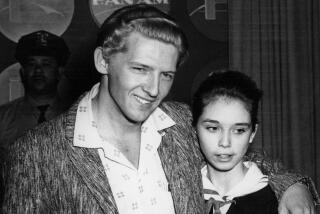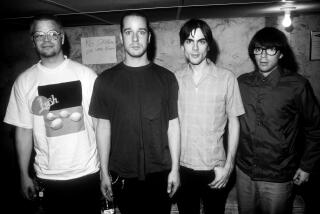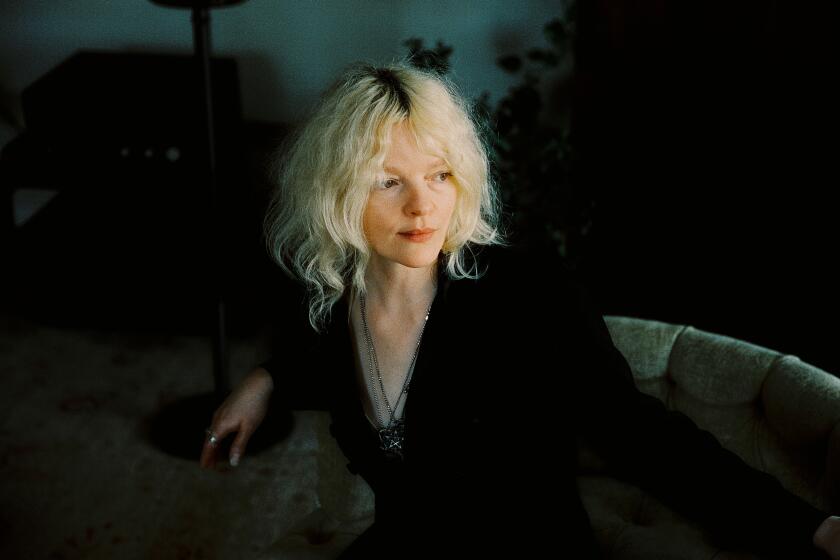‘92 Year In Review : Ministry: Boldest of the Year : Much of 1992’s best music was hard to find on the radio because it came from acts too radical or too sophisticated for mainstream pop-rock tastes
Pop music in 1992 lived for the most part in the creative shadow of 1991.
The greatest excitement was onstage rather than on record--and the most celebrated tours relied heavily on material from 1991 albums: U2’s “Zoo TV” extravaganza, the Guns N’ Roses/Metallica stadium marathons and the “Lollapalooza ‘92” festival trek.
Similarly, many of the year’s most captivating singles were drawn from last year’s albums--from U2’s reflective “One” to Guns N’ Roses’ melancholy “November Rain.”
This doesn’t mean that 1992 was void of imagination and heart on record. The best new music was simply harder to find than in 1991, when many of the top artists--including U2 and Nirvana--were also the top sellers.
Radio airplay and the sales charts the last 12 months were dominated by the likes of country lightweight Billy Ray Cyrus and pop sledgehammer Michael Bolton. Pop excellence, meanwhile, was achieved primarily by veteran artists without a deep sales base or by newcomers too radical for mainstream tastes.
The 1992 list is headed by the fearless vision and independent spirit of Ministry’s “Psalm 69.” This Chicago industrial-rock band specializes in a raw yet soulful sonic assault that may tap into the darkness of contemporary alienation and anger more uncompromisingly than anyone else in rock.
Elements of social commentary and struggle were also present in other key albums of 1992, including those by Arrested Development, Los Lobos and the Disposable Heroes of Hiphoprisy. But other noteworthy albums this year dealt with more personal and introspective matters--from Bruce Springsteen’s celebration of love and family to PJ Harvey’s fiery examination of the conflicts of relationships.
Here is my list of the most accomplished and affecting albums of 1992:
1 Ministry, “Psalm 69” (Sire/Warner Bros.). Al Jourgensen, the group’s leader, is the Keith Richards of industrial rock and this dark, foreboding collection is his “Exile on Main Street”--an expression of alienation so unbending that it makes the social disenchantment of most rival rock bands seem like kid’s stuff.
Likely to be one of the most influential works of the ‘90s, the album--a complex mix of jackhammer guitar jolt, hyperactive dance-club pulse and almost symphonic beauty--is so far from mainstream rock sensibilities that it has sold less since its July release than the 575,000 that Whitney Houston’s “The Bodyguard” album sold in a single week this month.
Rejecting language as insufficient to convey his intensity, Jourgensen employs only occasional outcries or sound bites as guideposts on a guitar-driven instrumental assault that lashes out at a world that he sees as so mired in chaos and compromise that it no longer seems to make sense to him.
“Tell me something I don’t know . . . Show me something I can use,” Jourgensen screams through the howl of guitars at one point, the surly accusation and bite in his voice leaving no expectation of a positive response. The band closes its triumphant year with concerts Saturday and next Sunday at the Universal Amphitheatre.
2 Bruce Springsteen, “Lucky Town” (Columbia). Springsteen ran into such a backlash this year that there was grumbling from former supporters at virtually every turn . . . that the new band was too sterile, that there weren’t enough old songs in the shows, even that he no longer showed desire on stage. But the most absurd complaint was that Springsteen wasn’t saying anything new in his music.
Until now, Springsteen was the loner and underdog who spoke about reaching for the emotional comfort of better days. In the heart of this album and the companion “Human Touch,” Springsteen--remarried and the father of two children--celebrates the better days in some of the most moving songs he has ever written.
Crucially, Springsteen hasn’t forgotten in this transformation all the years he spent in his personal darkness on the edge of town. Even the most optimistic new songs, including “Living Proof,” about the birth of his son, and “If I Should Fall Behind,” a wedding day pledge to his wife, acknowledged a hard-won happiness.
Sample lyrics from “Living Proof”:
You shot through my anger and rage
To show me my prison was just an open cage
There were no keys no guards
Just one frightened man and some old shadows for bars.
3 Arrested Development, “3 Years, 5 Months and 2 Days in the Life of. . .” (Chrysalis). Several of the rap groups that made important contributions to the widening of rap boundaries, including De La Soul, have had trouble following up on their early promise, but Arrested Development has the ambition and talent to be around for the long run. “Joyful” is the word invariably applied to the Georgia band’s debut, which combines elements of hippie idealism with Sly Stone’s psychedelic imagination and contemporary hip-hop freshness. Typical of Arrested Development, the group’s wistful, spiritually tinged hit single, “Tennessee,” tries to reconcile life’s blessings with its heartaches.
4 Los Lobos, “Kiko” (Slash/Warner Bros.). In a stirring return by Los Lobos to the eloquence and purpose of 1987’s “By the Light of the Moon,” this collection was especially welcome when it arrived in the stores last spring just after the Los Angeles riots. “Kiko” offered much of the cross-cultural warmth of Paul Simon’s “Graceland” at a time when the city needed healing. But time hasn’t diminished its heartfelt message and textures. Graced by richly tailored musical punctuation and masterful production touches, the album continues to exude a rich, disarming spirit.
5 Lou Reed, “Magic and Loss” (Sire/Warner Bros.). The subject is death and Reed explores it with as penetrating and poetic an eye as anyone in pop has ever turned to it. In this moving exercise inspired by the deaths of two friends, Reed emerges from his questioning and sadness with an even richer appreciation of life. “Magic and Loss” is so personal and poignant that it stands as a living example of the old boast about an artist’s work being an artist’s greatest gift.
6 The Jesus and Mary Chain, “Honey’s Dead” (Def American). One of rock’s great bands, the Mary Chain bombed on the summer “Lollapalooza” tour where daylight backdrops and the band’s rigid anti-performance attitude caused much of the audience to tune out. So brothers Jim and William Reid--the London-based band’s guiding forces--continue to search for an audience in this country. Meanwhile, they go on making extraordinary, influential albums; tales of obsession, set against an alluring background of harsh guitar feedback and sweet, seductive melodies.
7 PJ Harvey, “Dry” (Indigo/Island). In the gripping, soul-baring tradition of Patti Smith’s “Horses” and Sinead O’Connor’s “I Do Not Want What I Haven’t Got,” Polly Jean Harvey--the leader of this British band--explores relationships and inner longings/insecurities with such unflinching resolve that this album--sorry, Madonna--was pop’s genuine truth-or-dare exercise. Despite an occasional folk gentleness, the music--supplied by bassist Stephen Vaughan, drummer Robert Ellis and guitarist Harvey--mostly mixes punk-accented insistence with blues-rock power-trio fury.
8 R.E.M., “Automatic for the People” (Warner Bros.). After the traces of mainstream frivolity in 1988’s “Green,” it was hard to picture this band ever regaining the U.S. rock leadership role it enjoyed during its remarkable “Murmur” to “Document” stretch. But this deftly crafted, hauntingly introspective collection makes you wonder how you have ever doubted their resolve. “Everybody Hurts” is as simple, yet affecting as pop music can be. Without losing the innocence and mystery, R.E.M. emerges as at once more questioning and more revealing.
9 Neil Young, “Harvest Moon” (Reprise). Far more than simply a sequel to 1972’s celebrated “Harvest,” this acoustic album provides a tender series of looks on life’s changing ideals and dreams. In “From Hank to Hendrix,” Young could either be talking about a loved one or simply the power of music itself: I always expected / That you would see me through / I never believed in much / But I believed in you. Despite the often strange turns in his career, Young has always been someone to believe in. “Such a Woman,” another standout, is a love song of such open, unguarded intensity that it recalls John Lennon’s early solo work.
10 The Disposable Heroes of Hiphoprisy, “Hypocrisy Is the Greatest Luxury” (4th & B’Way/Island). Rapper Michael Franti and deejay Rono Tse are a bridge between the musical sophistication of Arrested Development, Basehead and others in rap’s new alternative wing and the sociopolitical urgency of Public Enemy. The sophisticated, understated musical shading contrasts well the dynamic verbal attack of Franti, who joins Chuck D., Ice Cube and KRS-One as one of the most important and articulate voices in rap.
More to Read
The biggest entertainment stories
Get our big stories about Hollywood, film, television, music, arts, culture and more right in your inbox as soon as they publish.
You may occasionally receive promotional content from the Los Angeles Times.






